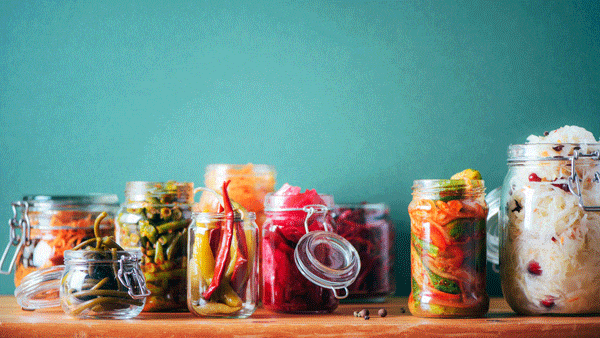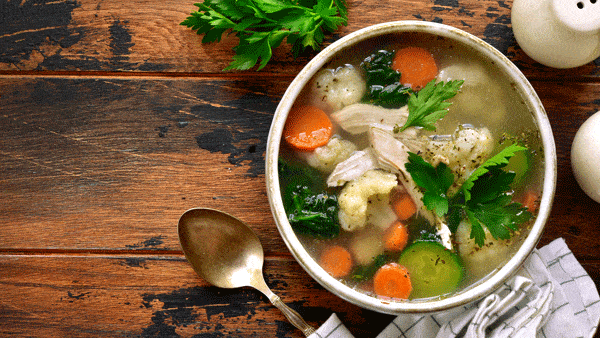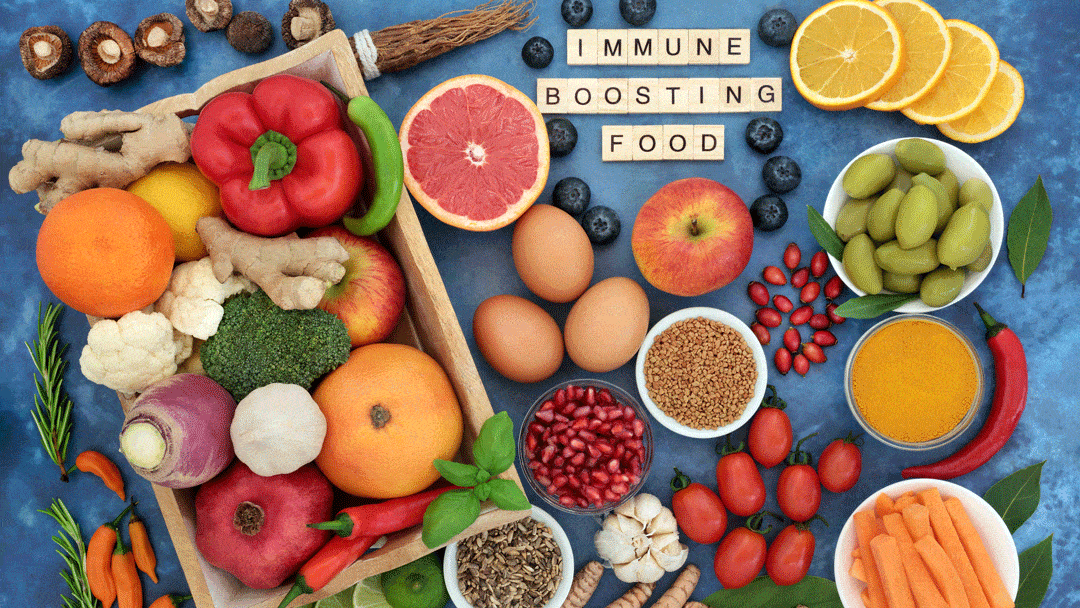It’s been said that elephants never forget, but you know what else has this amazing skill? Your immune system! This complex disease-fighting network inside your body remembers every germ it has ever defeated so that when a virus or bacteria takes a second shot at making you sick, the immune system is able to quickly recognize and fend off the invaders.
As a registered dietitian with TELUS Health MyCare™, I know our immune systems work harder when we are exposed to more germs. When kids go back to school, for instance, or when the weather cools down, more people start coughing and sneezing. That’s why it’s more important than ever to eat healthy foods that help keep your immune system strong and to avoid foods that weaken it.
Best foods for your immune system

Eat plenty of fibre-rich fruits and vegetables to support the growth of beneficial microbes in your gut. As well as helping to digest food, this microbiota crowds out and kills potentially harmful bacteria, strengthens your immune system, and even plays a role in keeping you mentally sharp and reducing the risk of mental illness.
Prebiotic foods feed and maintain these microbes, while probiotic foods invite beneficial microorganisms to the party.
Prebiotic foods
- Garlic
- Onions
- Leeks
- Slightly unripe bananas
- Apples
- Beans
- Lentils
- Cashews
Probiotic foods
- Kombucha. This fermented black tea drink that’s lightly fizzy and sweet. It’s available in most supermarkets
- Yogurt with live active cultures. Try some greek yogurt instead of sour cream when you eat nachos, tacos, or burritos.
- Miso. The word “miso” means fermented beans in Japanese. If you go for sushi, try some miso soup as a starter. Your gut and your taste buds will thank you!
- Kimchi. This traditional Korean dish is made with salted and fermented vegetables like cabbage and radishes. When you go for Korean food, kimchi is a standard side.
- Sauerkraut. This fermented cabbage is delicious as a condiment. Look for unpasteurized sauerkraut to get the full immune-boosting benefits.
Does spicy food help your immune system?
While there is little reliable research to support the immunity-boosting benefits of spicy food, adding hot sauces, chilli pastes, sliced hot peppers and spices like cayenne pepper and chilli powder is a great way to power up the flavour and cut down on your salt intake.
Zinc helps you avoid getting sick
Foods rich in zinc also help keep your immune system purring. That’s because the antioxidant mineral supports the growth and normal functioning of the immune cells that protect your body from viruses and bacteria.
Many foods contain lots of zinc: beans and lentils, nuts and seeds, seafood, poultry, tofu, and the list goes on. Dine on these, and there’s no need to take zinc supplements. Speaking of which…
Are supplements needed to boost your immune system?
As a general rule, it’s better to get healthy nutrients from food than from supplements. Vitamin C, for instance, is plentiful in foods like citrus fruits, bell peppers, tomatoes and potatoes.
That said, some vitamins are more challenging to work into your diet, and when it comes to strengthening your immune system, Vitamin D tops the list.
Vitamin D is naturally produced by our bodies when our skin is exposed to the sun’s rays. Many Canadians, however, are deficient in this vitamin, particularly during winter when our skin makes less of it. Most foods contain very little vitamin D, so one way to ensure you are getting enough is with a supplement. Talk to your health care professional about how much to take.
Foods that weaken your immune system
Snacking on too many ultra-processed low-fibre foods—fatty potato chips, cookies and doughnuts, salty deli meats, and microwave dinners, to name a few—can do a number on your immune system.
What foods boost your immune system when you get sick?

Your appetite can take a hit when you’re sick, which puts you at risk of falling short on the immunity-boosting nutrients you need. That’s where chicken noodle soup comes in as a soothing meal that contains a healthy balance of protein, carbohydrates and fat.
Soup is mostly water, which is a good thing since staying well hydrated is key when you’re under the weather. You should aim to consume at least three litres of fluids per day when you’re sick. Juicy fruits, popsicles, and yogurt all count towards your daily fluid intake since they have a high water count and boost hydration. The same goes for smoothies—throw some fruits and veggies in there; it counts as a fluid, and you’ll get healthy doses of fibre and vitamin C.
What food makes you feel better when you’re under the weather? Help your sneezing buds by sharing it in the comments below!


Oh, I love miso soup so much! It’s not just good for the tummy but for the immune system too. A warm bowl of miso is like a cozy hug for the soul.
We couldn’t agree more, Sofiya.
~Canadian Men’s Health Foundation team member